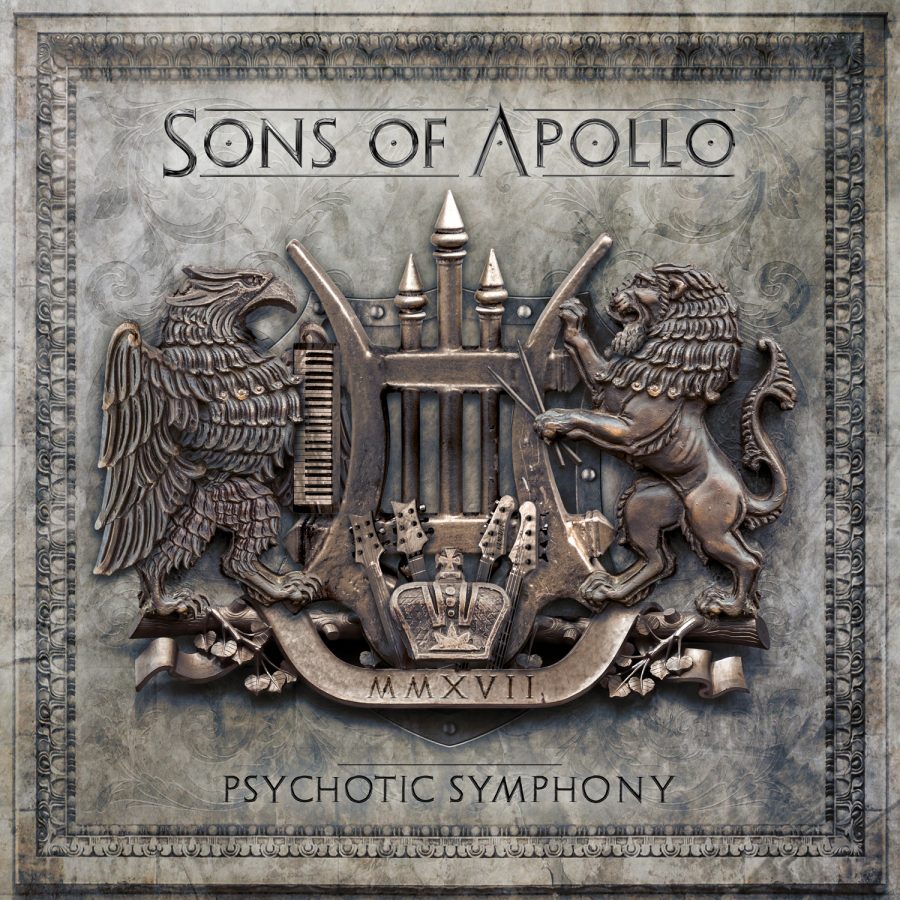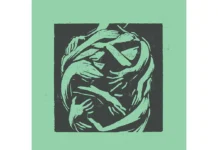“For Apollo so loved the world that he gave his only 5 sons…”
Or in layman’s terms, DREAM THEATER alumni Mike Portnoy (drums) and Derek Sherinian (keyboards) joined forces with ex-GUNS ‘N’ ROSES guitarist Ron “Bumblefoot” Thal, MR. BIG bassist Billy Sheehan, and one-time JOURNEY frontman Jeff Scott Soto to form a progressive metal supergroup under the banner SONS OF APOLLO. As a founding member of DREAM THEATER, Portnoy is surely one of the father figures of the genre, but after his departure from the group in 2010 he hasn’t revisited that style in any of his studio bands until now, so there’s been a certain amount of excitement about his return. Sherinian has been talking about “reclaiming the throne” and taking more or less veiled jabs at his and Portnoy‘s former band on Twitter, so it’s time to listen to “Psychotic Symphony” and see whether the hype is real or if the self-proclaimed new kings have no clothes.

To be completely honest, I haven’t actively listened to any of Portnoy‘s projects outside of DREAM THEATER besides OSI, of which he’s no longer a part. Although I feel that DT went downhill towards the end of his tenure, partially because of his increasing control on their direction, it’s not that I hate the guy, but for some reason none of his bands in particular have resonated with me. Now that he’s paired up with Sherinian, whose time with DT was so short that he didn’t get to show his full potential, I wanted to hear whether I’d finally get into something he’s done. The talks about combining modern prog metal with classic hard rock were also intriguing, as that’s an influence that’s unfortunately neglected by a lot of newer bands in the scene.
“God of the Sun” opens the album with sitar sounds and a keyboard solo reminiscent of the intro to DREAM THEATER‘s “Lines in the Sand.” The orientally influenced epic is a great way to kick things off with its soaring chorus and heavy riffs. In the middle it calms down for a while, only to be followed by a complex instrumental section, which along with the song’s structure is reminiscent of latter-day Portnoy-era DT, but doesn’t go totally over the top luckily. Video track “Coming Home” is a straightforward rocker that you can almost imagine playing after a Horatio Caine one-liner, with the opening scream and all. It may not be a groundbreaking tune, but it’s catchy, and the organ and delay guitar break in the middle is nice. The first single, “Signs of the Time” is a fairly standard prog metal song and not that special, but it’s saved by Thal‘s fascinating solo.
“Labyrinth” makes me think Sherinian has been listening to HAKEN lately, as the ’80s synths at the 2½-minute mark are like straight out of “1985.” Most likely both have simply been influenced by Vince DiCola, but the similarities are uncanny nevertheless, and this coupled with the forgettable instrumental break in the middle is a letdown, because the song starts out so well. “Alive” is a post-grunge/alternative rock-sounding melodic anthem that’s the closest thing to a ballad on the album, which makes it refreshing and one of the standout songs. “Lost in Oblivion,” on the other hand, is prog metal business as usual – the riffs and melodies are fairly standard, and apart from the album name dropping there’s not much of note here. Sherinian‘s organ solo “Figaro’s Whore” leads us into the DEEP PURPLE-influenced “Divine Addiction,” which is like a cousin of “Perfect Strangers.” The vibe and the energy are good on this tune, and I can see it working nicely live. Sadly the album falls flat at the end – “Opus Maximus” may please fans of Sherinian‘s Planet X project and those who like their prog super-technical, but I find the 10-minute instrumental rather tedious and self-indulgent, as well as a weird choice to end the album.
When it comes to individual performances, Ron Thal and Derek Sherinian are the star players. Thal in particular surprised me, as I’d never heard his playing before, but he’s an accomplished guitarist whose solos are tonally interesting and not your typical shred or pentatonic licks. Sherinian‘s sound palette is wide, with more symphonic and modern sounds than during his DREAM THEATER tenure, and he has a much bigger role in SONS OF APOLLO. While Mike Portnoy may be the boss, it’s clear that without Sherinian‘s input, “Psychotic Symphony” wouldn’t sound the way it is.
Speaking of Portnoy, he does his job well behind the kit, but despite having played other styles than progressive metal for the past 7 years, he’s still recycling the fills and tricks he was playing in DREAM THEATER. Whether that makes you feel nostalgic or think he’s stagnated probably depends on how big a fan of the man you are – I find myself leaning towards the latter option. Billy Sheehan‘s playing is fine, but I’m not a big fan of his bass tone, as at some points the rumble buries the guitar, the worst offender being the verses of “Coming Home.” Also, most prog bands have a vocalist with a distinctive voice that may split opinions among listeners, but this is where SONS OF APOLLO fall short a bit – Jeff Scott Soto is a competent hard rock/AOR singer who is the perfect man to sing a track like “Alive,” but in the proggiest moments he comes across as a hired pair of lungs and his voice doesn’t have the kind of uniquity that would elevate the music to the next level.
So are SONS OF APOLLO the saviors of prog metal? Based on “Psychotic Symphony” I have to say nay, but it’s not a bad start. Due to the lack of ballads and slow moments, I find the album a little fatiguing and “Opus Maximus” comes across as a desperate attempt to one-up both DREAM THEATER and the new generation of shredders. I find myself enjoying the fivesome’s rocking side though, as it seems to come more naturally from them, and Soto‘s vocals in particular work better in that style. I’m a little skeptical about the longevity of supergroups in general, but if these guys get to tour the world, become a tighter unit, and make another record, I can see good things happening.
Written by Wille Karttunen
Musicalypse, 2017
OV: 2750 / 1347
“Apollo on rakastanut maailmaa niin paljon, että antoi ainoat viisi poikaansa…” Toisin sanoen Dream Theater -alumnit Mike Portnoy (rummut) ja Derek Sherinian (kosketinsoittimet) pistivät ex-Guns N’ Roses -kitaristi Ron “Bumblefoot” Thalin, Mr. Big -basisti Billy Sheehanin ja kertaalleen Journeyn keulilla laulaneen Jeff Scott Soton kanssa pystyyn progressiivisen metallin superryhmän Sons of Apollo. Dream Theaterin perustajajäsenenä Portnoy on yksi genren isähahmoista, mutta bändistä erottuaan hän ei ole päätynyt kyseisen tyylin pariin yhdenkään studiobändinsä kanssa ennen kuin nyt, joten hänen paluunsa on herättänyt jonkinasteista innostusta. Sherinian on puhunut valtaistuimen lunastamisesta takaisin ja heittänyt enemmän tai vähemmän verhoiltuja herjoja entistä bändiään kohtaan Twitterissä, joten on aika kuunnella Psychotic Symphony ja katsoa, onko hype aiheellista vai onko uusiksi kuninkaiksi julistautuneilla vaatteita lainkaan.
Jos rehellisiä ollaan, en ole kuunnellut aktiivisesti yhtään Portnoyn Dream Theaterin ulkopuolista projektia, lukuun ottamatta OSI:ta, jossa hän ei enää soita. Vaikka DT menikin hänen aikanaan alamäkeen loppua kohti, osittain hänen vahvan otteensa vuoksi, en inhoa miestä, vaan jostain syystä yksikään hänen bändeistään ei ole erityisesti säväyttänyt minua. Nyt kun hän on lyönyt hynttyyt yhteen Sherinianin kanssa, jonka pesti DT:ssä jäi niin lyhyeksi, ettei hän kerennyt näyttämään kaikeka potentiaaliaan, halusin nähdä joko vihdoin tykästyisin johonkin hänen tuotokseensa. Puheet modernin progemetallin yhdistämisestä klassisen hard rockin kanssa olivat myös mielenkiintoisia, sillä kyseessä on vaikute, jonka harmillisen monet uudet bändit skenessä ovat jättäneet huomiotta.
“God of the Sun” avaa albumin sitar-soundeilla ja Dream Theaterin “Lines in the Sandin” introa muistuttavalla kosketinsoololla. Itämaisilla vaikutteilla höystetty eepos on mainio tapa potkaista levy käyntiin huimine kertosäkeineen ja raskaine riffeineen. Puolivälissä biisi rauhoittuu hetkeksi, vain jatkuakseen monimutkaisella instrumentaaliosiolla, joka kappaleen rakenteen tavoin muistuttaa myöhempää Portnoyn aikaista DT:ia, muttei onneksi mene ihan överiksi. Videoraita “Coming Home” on suoraviivainen rokkiralli, jonka alkukiljaisuineen voisi melkein kuvitella kuulevansa Horatio Cainen repliikin jälkeen. Se ei välttämättä ole mullistava kappale, mutta se on tarttuva, ja puolivälin urku- ja delay-kitaraosuus on antoisa. Ensisingle “Signs of the Time” on aika tavallinen progemetallibiisi eikä sinällään erityinen, mutta Thalin kiehtova soolo pelastaa sen.
“Labyrinth” pistää miettimään, onko Sherinian kuunnellut Hakenia lähiaikoina, sillä kahden ja puolen minuutin kohdalla kuultavat kasarisyntikat ovat kuin suoraan “1985:sta”. Todennäköisesti molemmat ovat vain ottaneet vaikutteita Vince DiColalta, mutta samankaltaisuus on hämmästyttävän suuri, ja tämä yhdistettynä yhdentekevään instrumentaaliväliosaan on pettymys, sillä biisi alkaa erittäin lupaavasti. “Alive” on post-grunge/vaihtoehtorock-henkinen melodinen laulu, joka on levyn annista lähimpänä balladia, mikä tekee siitä piristävän ja erottuvan. “Lost in Oblivion” sen sijaan edustaa jälleen tavanomaista progemetallia – riffit ja melodiat ovat peruskauraa, eikä albumin nimen mainintaa lukuun ottamatta mitään huomioitavaa tapahdu. Sherinianin urkusoolo “Figaro’s Whore” johdattelee deeppurplemaisen “Divine Addictionin” pariin, joka on kuin “Perfect Strangersin” serkku. Biisin tunnelma ja energia ovat hyviä, ja uskon sen toimivan mainiosti livenä. Harmillisesti levy loppuu latteasti: “Opus Maximus” tyydyttänee Sherinianin Planet X -projektin faneja ja niitä, jotka haluavat progensa superteknisesti tarjoiltuna, mutta itse pidän tätä 10-minuuttista instrumentaalia melko pitkäveteisenä ja omahyväisenä sekä outona tapana päättää albumi.
Kun yksittäiset soittosuoritukset otetaan puheeksi, Ron Thal ja Derek Sherinian ovat levyn tähdet. Varsinkin Thal yllätti minut, sillä en ollut kuullut hänen soittoaan aiemmin, mutta hän on pätevä kitaristi, jonka soolot ovat nuottivalinnoiltaan mielenkiintoisia eivätkä tyypillisintä tilutusta tai pentatonista kikkailua. Sherinianin äänipaletti on laaja, sisältäen enemmän sinfonisia soundeja kuin hänen Dream Theater -pestinsä aikaan, ja hänen roolinsa Sons of Apollossa on paljon suurempi. Vaikka Mike Portnoy ehkä onkin pomo, on selvää ettei Psychotic Symphony kuulostaisi tällaiselta ilman Sherinianin panosta. Portnoysta puheen ollen, hän hoitaa hommansa kannujen takana hyvin, mutta vaikka hän onkin soittanut ihan muuta musiikkia kuin progressiivista metallia viimeisten seitsemän vuoden ajan, hän kierrättää samoja fillejä ja temppuja kuin Dream Theater -aikoinaan. Se, tekeekö tämä nostalgiseksi vai saako se pitämään miestä kaavoihin kangistuneena riippunee siitä, kuinka suuri miehen fani on – itse kallistun jälkimmäiseen vaihtoehtoon. Billy Sheehanin soitossa ei ole vikaa, mutten erityisemmin innostu hänen bassosoundistaan, sillä paikoitellen sen jyrinä hautaa kitaran alleen, pahimpana esimerkkinä “Coming Homen” säkeistöt. Lisäksi siinä, missä useimmilla progebändeillä on laulaja, jolla on mahdollisesti mielipiteitä jakava omalaatuinen ääni, Sons of Apollo ei ihan onnistu: Jeff Scott Soto on osaava hard rock/AOR -solisti, joka on mies paikallaan “Aliven” kaltaisissa kappaleissa, mutta progressiivisemmissa biiseissä hän kuulostaa lähinnä palkatulta sessiokeuhkoparilta, eikä hänen äänessään ole ainutlaatuisuutta, joka nostaisi musiikin seuraavalle tasolle.
Ovatko Apollon pojat progemetallin pelastajia? Psychotic Symphonyn perusteella vastaukseni on kieltävä, mutta aloitus ei ole hassumpi. Balladien ja hitaiden hetkien puutteen vuoksi levy on putkeen kuunneltuna hieman väsyttävä, ja “Opus Maximus” tuntuu epätoivoiselta yritykseltä päihittää Dream Theater ja uuden sukupolven tiluttajat teknisyydessä. Nautin kuitenkin viisikon rokkaavasta puolesta, sillä se tuntuu heille luontaisemmalta, ja varsinkin Soton ääni toimii kyseisessä tyylissä paremmin. Olen hieman skeptinen superkokoonpanojen pitkäikäisyyden suhteen, mutta jos nämä tyypit kiertävät maailmaa, hitsaantuvat tiiviimmin yhteen ja tekevät toisen levyn, uskon parempaa olevan luvassa.Tracklist
- God of the Sun
- Coming Home
- Signs of the Time
- Labyrinth
- Alive
- Lost in Oblivion
- Figaro’s Whore
- Divine Addiction
- Opus Maximus
Lineup
Jeff Scott Soto – lead vocals, acoustic guitar
Ron “Bumblefoot” Thal – guitar, backing vocals
Billy Sheehan – bass, backing vocals
Derek Sherinian – keyboards, backing vocals, string arrangements
Mike Portnoy – drums, vocals
Label
InsideOut Music
Links
Recent posts
[recent_post_carousel design=”design-1″]





